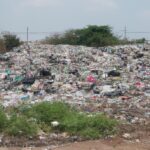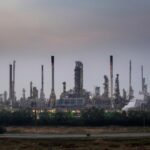Pollution is an ever-increasing concern that poses grave threats to our planet and all its inhabitants. It refers to the contamination of air, water, or soil by harmful substances, resulting from human activities such as industrial manufacturing, vehicle emissions, and improper waste disposal. The consequences of pollution are far-reaching and encompass ecological degradation, climate change, and detrimental health effects. It disrupts ecosystems, endangers biodiversity, and contributes to the depletion of natural resources. Pollution is a global issue that demands urgent attention and concerted efforts to mitigate its devastating impact on the environment and safeguard the well-being of future generations.
Pollution refers to the introduction of harmful substances or contaminants into the environment, resulting in adverse effects on the ecosystem, human health, and the quality of life. Pollution can occur in various forms, including air pollution, water pollution, soil pollution, and noise pollution. Each form of pollution poses a significant threat to the environment and all living beings.
Air pollution is a pressing concern that arises from the release of pollutants into the atmosphere, primarily through the burning of fossil fuels, industrial emissions, and vehicular exhaust. These pollutants, such as particulate matter, sulfur dioxide, nitrogen oxides, and carbon monoxide, contribute to the formation of smog and can cause respiratory problems, cardiovascular diseases, and even premature death.
Similarly, water pollution occurs when harmful substances, such as chemicals, sewage, heavy metals, and plastics, contaminate water bodies like rivers, lakes, and oceans. This contamination poses a severe threat to aquatic organisms and can lead to the loss of biodiversity. Additionally, contaminated water can have detrimental effects on human health, causing diseases like cholera, dysentery, and hepatitis.
Soil pollution, also known as land pollution, involves the contamination of soil by industrial waste, chemicals, pesticides, and improper disposal of solid waste. This type of pollution affects agricultural productivity, as well as the health of plants and animals. Furthermore, it can lead to the depletion of soil fertility, making it unsuitable for agriculture, and posing risks to the food chain.
Noise pollution is another major concern caused by excessive noise, particularly in urban areas. Sources of noise pollution include transportation, construction activities, industrial machinery, and loud music. Prolonged exposure to high levels of noise can have adverse effects on human health, including stress, hearing loss, and impaired sleep patterns.
Pollution is a global problem that requires immediate attention and action. To combat pollution, various measures can be implemented, such as the use of cleaner technologies, stricter regulations, promoting sustainable practices, and raising public awareness. It is crucial for individuals, businesses, and governments to work together to reduce pollution and protect our planet for future generations.
Causes of pollution
Air pollution, water pollution, soil pollution, and noise pollution are known to be the major types of pollution that are affecting our environment. These forms of pollution are caused by various sources and activities, all of which contribute to the degradation of our ecosystems and the overall health and well-being of living organisms.
Firstly, one of the leading causes of air pollution is the burning of fossil fuels. Industries, vehicles, and power plants that rely on fossil fuels emit a wide range of pollutants, including carbon dioxide, sulfur dioxide, nitrogen oxides, and particulate matter. These pollutants contribute to the greenhouse effect, leading to global warming and climate change, as well as to respiratory and cardiovascular diseases in humans.
Secondly, deforestation is another significant factor contributing to pollution. Trees play a critical role in absorbing carbon dioxide and producing oxygen. However, the rapid destruction of forests for agricultural purposes, urbanization, and logging disrupts this balance, leading to increased levels of carbon dioxide in the atmosphere. Moreover, deforestation also contributes to soil erosion, loss of biodiversity, and flooding, further deteriorating the overall health of ecosystems.
Industries and households are also responsible for water pollution. Industrial wastewater and untreated sewage often find their way into rivers, lakes, and oceans, contaminating the water and affecting marine life. In addition, agricultural run-off, including pesticides and fertilizers, also contributes to water pollution. The excessive use of these chemicals leads to the eutrophication of water bodies, causing the overgrowth of algae and the depletion of oxygen levels, leading to the death of aquatic organisms.
Soil pollution is primarily caused by the improper disposal of industrial waste and the excessive use of chemical fertilizers and pesticides in agriculture. These pollutants contaminate the soil, leading to reduced soil fertility and the death of beneficial microorganisms. Additionally, improper waste management practices, such as the dumping of hazardous materials in landfills or open areas, can also contaminate the soil and pose a risk to human health.
Lastly, noise pollution has become a prevalent issue, especially in urban areas. Construction activities, traffic noise, industrial machinery, and loud music are all sources of noise pollution. Prolonged exposure to high levels of noise can lead to numerous health problems, including hearing loss, stress, and sleep disturbances.
In conclusion, pollution is a significant environmental issue that is caused by various sources and activities. The burning of fossil fuels, deforestation, industrial and agricultural practices, and noise-generating activities all contribute to different forms of pollution. It is crucial to raise awareness and take action to mitigate these causes in order to preserve our environment and ensure a sustainable future for all.
Effects of pollution
Pollution is a significant problem that affects not only our environment but also the living organisms inhabiting it, including humans. The effects of pollution are widespread and can have severe consequences on various aspects of life. From the air we breathe to the water we drink, pollution exerts its harmful impact on our planet in many ways.
Air pollution is one of the most widespread forms of pollution and has adverse effects on both human health and the environment. Inhalation of polluted air can lead to respiratory problems such as asthma, bronchitis, and other chronic respiratory diseases. Long-term exposure to air pollution has also been linked to an increased risk of cardiovascular diseases and cancer. Moreover, air pollution can harm ecosystems by damaging plant life, reducing crop yields, and disrupting the balance of fragile ecosystems.
Water pollution is another pressing concern, primarily caused by industrial waste, sewage treatment plants, and agricultural runoff. Contaminated water bodies pose a risk to human health, as they can transmit various diseases like cholera and dysentery. Furthermore, aquatic life suffers greatly from polluted water, with fish and other marine organisms being particularly affected. Water pollution also harms coral reefs, disrupts the reproductive cycles of aquatic animals, and reduces the overall biodiversity of ecosystems.
Soil pollution is yet another consequence of human activities such as improper waste disposal, industrial contamination, and excessive use of pesticides and fertilizers in agriculture. Polluted soil negatively affects crop production, leading to reduced agricultural yields and quality. Additionally, toxins present in the soil can contaminate groundwater, further exacerbating water pollution. Soil pollution also poses a risk to human health when food crops grown in contaminated soil are consumed.
Noise pollution, although often overlooked, can also have detrimental effects on human well-being. Excessive noise levels can cause stress, sleep disturbances, and hearing loss. Prolonged exposure to loud noises can even lead to high blood pressure and increased risk of heart disease. Noise pollution can also disrupt animal communication and behavior and disturb natural habitats.
Pollution also impacts climate change, contributing to the greenhouse effect and global warming. Emissions from vehicles, industrial processes, and the burning of fossil fuels release greenhouse gases into the atmosphere, trapping heat and causing the planet’s temperature to rise. This leads to a host of consequences, including more frequent and severe natural disasters, melting ice caps and glaciers, rising sea levels, and changes in weather patterns, all of which have far-reaching effects on ecosystems and human societies.
In conclusion, pollution has far-reaching and devastating effects on our environment and health. It impairs air quality, contaminates water bodies, degrades soil, disrupts ecosystems, harms wildlife, and contributes to climate change. Recognizing the severity of pollution’s consequences is crucial in order to take immediate action to mitigate its effects. We must prioritize sustainable practices, reduce the use of harmful substances, promote alternative energy sources, and adopt environmentally friendly lifestyles to restore and preserve the planet for future generations.
Types of pollution
Types of Pollution:
There are several types of pollution that have detrimental effects on the environment and human health. Each type of pollution arises from different sources and has its own set of consequences. Understanding the different types of pollution is crucial in developing effective strategies to combat and prevent them.
1. Air Pollution:
Air pollution refers to the contamination of the air by harmful substances, such as pollutants and toxic gases. These can be released into the atmosphere from various sources such as vehicles, industrial activities, and burning fossil fuels. The main pollutants responsible for air pollution include carbon monoxide, sulfur dioxide, nitrogen oxides, and particulate matter. Prolonged exposure to air pollution can lead to respiratory problems, heart disease, and even premature death.
2. Water Pollution:
Water pollution occurs when pollutants contaminate freshwater sources such as rivers, lakes, and underground water. Common sources of water pollution include industrial waste, agricultural runoff, sewage, and oil spills. The pollution can harm aquatic life, disrupt ecosystems, and make water sources unfit for human consumption. It also poses significant health risks for individuals who come into contact with polluted water, leading to diseases such as cholera and hepatitis.
3. Noise Pollution:
Noise pollution refers to excessive or unwanted noise that impairs human well-being and disrupts the environment. It can be caused by various activities, including transportation, construction work, industrial processes, and loud music. Prolonged exposure to high levels of noise pollution can result in hearing loss, sleep disruption, stress, and impairment of cognitive function.
4. Soil Pollution:
Soil pollution occurs when the soil becomes contaminated with hazardous substances, such as pesticides, chemicals, heavy metals, and industrial waste. This pollution can affect soil fertility, disrupt ecosystems, and contaminate food crops, posing risks to human health. Soil pollution is predominantly caused by improper disposal of waste, excessive use of chemicals in agriculture, and industrial activities.
5. Light Pollution:
Light pollution refers to the excessive or misdirected artificial lighting that has negative impacts on the environment and human health. It disrupts natural ecosystems, affects wildlife behavior, and disturbs the circadian rhythm of humans. Light pollution can also hinder astronomical observations and waste significant amounts of energy.
6. Thermal Pollution:
Thermal pollution occurs when there is a discharge of excessive heat into natural water bodies, such as rivers or lakes. This usually arises from industrial processes, power plants, or cooling systems. Elevated water temperatures resulting from thermal pollution can disrupt ecosystems and harm aquatic life by reducing oxygen levels and promoting the growth of harmful algae.
Understanding these types of pollution is essential for implementing effective measures to mitigate and prevent them. Adopting environmentally friendly practices, such as reducing emissions, improving waste management, and promoting sustainable alternatives, can help minimize pollution and create a healthier, cleaner environment for future generations.
Solutions to pollution
Solutions to pollution encompass a wide range of strategies and approaches aimed at mitigating and minimizing the various forms of pollution that exist today. These solutions are essential for protecting the environment, human health, and the overall well-being of our planet. The following are some significant measures that can be taken to combat pollution:
1. Reduce Emission Levels: One of the most effective ways to tackle pollution is to reduce emissions from various sources. Industries and power plants can adopt cleaner technologies and practices to decrease air pollutants. Additionally, governments can enforce stricter regulations and standards on vehicle emissions, leading to improved air quality.
2. Transition to Renewable Energy: Shifting from fossil fuel-based energy sources to renewable alternatives like solar, wind, and hydropower can significantly reduce pollution. By embracing cleaner energy methods, greenhouse gas emissions can be decreased, leading to a cleaner and healthier environment.
3. Waste Management: Proper management of waste is crucial to prevent pollution of land, water, and air. Encouraging recycling, composting, and proper disposal of hazardous waste are effective ways to tackle pollution.
4. Water Treatment and Conservation: Implementing advanced water treatment systems can help remove pollutants from wastewater before it is released into bodies of water. Furthermore, promoting responsible water usage and conservation practices can significantly reduce water pollution.
5. Reforestation and Afforestation: Planting more trees and preserving existing forests are important solutions to pollution. Trees act as natural filters, absorbing pollutants and releasing clean oxygen into the atmosphere. They also help combat climate change by sequestering carbon dioxide.
6. Awareness and Education: Increasing public awareness about the causes and impacts of pollution is crucial. By educating individuals about the importance of adopting eco-friendly practices, reducing waste, and conserving resources, we can collectively work towards minimizing pollution.
7. Sustainable Agriculture: Adopting sustainable farming practices, such as organic farming and agroforestry, can reduce the use of harmful pesticides and fertilizers that contribute to water and soil pollution.
8. International Cooperation: Pollution is a global issue that requires collaborative efforts and cooperation among nations. Establishing international agreements and frameworks, like the Paris Agreement, facilitates shared goals and actions to combat pollution on a larger scale.
9. Technology and Innovation: The development of innovative technologies can contribute to pollution control. For example, the use of electric vehicles, advancements in air filtration systems, and the development of more efficient and eco-friendly manufacturing processes can significantly reduce pollution levels.
10. Individual Responsibility: Each person has a role to play in minimizing pollution. By adopting sustainable practices such as reducing waste, conserving energy, using public transportation, and supporting eco-friendly products, individuals can contribute to a cleaner and healthier environment.
In conclusion, addressing pollution requires a multifaceted and collaborative approach. By implementing these solutions on a global scale and involving individuals, governments, industries, and organizations, we can effectively reduce pollution and ensure a sustainable future for generations to come.
Importance of addressing pollution
Addressing pollution is of utmost importance in order to ensure the well-being of our planet and all its inhabitants. Pollution, in its various forms, has severe negative impacts on the environment, human health, and the economy. Therefore, taking timely and effective measures to address pollution is vital to sustain a healthy and prosperous planet for future generations.
Firstly, addressing pollution is crucial for the preservation and protection of the environment. Pollution, whether it is air, water, or soil pollution, disrupts the delicate balance of ecosystems and can cause irreparable damage to plants, animals, and their habitats. By addressing pollution, we can minimize the negative effects on biodiversity, prevent the extinction of species, and maintain the ecological balance necessary for all life forms to thrive.
Furthermore, tackling pollution is essential for safeguarding human health. Pollution, particularly air and water pollution, poses significant risks to human well-being. It is responsible for a wide range of health problems, including respiratory issues, cardiovascular diseases, cancers, neurological disorders, and even premature death. By addressing pollution, we can reduce these health risks, promote healthier lives, and ensure a better quality of life for people all around the world.
Addressing pollution is also closely tied to the sustainability of our economy. Pollution has severe economic implications, affecting industries, agriculture, and tourism. It leads to increased healthcare costs, decreased productivity, and damage to infrastructure. By taking action to address pollution, we can avoid such economic losses and create opportunities for sustainable development and job growth, particularly in clean and renewable energy sectors.
Moreover, addressing pollution is a moral responsibility. As stewards of the planet, it is our duty to protect and preserve the natural resources that sustain life. Failing to take action to address pollution not only compromises our own well-being but also threatens the lives of future generations. By addressing pollution, we can ensure a cleaner and safer world for our children and grandchildren, where they can enjoy the beauty of nature and the benefits it offers.
Lastly, addressing pollution is essential in the fight against climate change. Pollution, particularly in the form of greenhouse gas emissions, is one of the leading causes of global warming and climate instability. By reducing pollution, we can mitigate the impacts of climate change, such as rising temperatures, extreme weather events, and sea-level rise. This, in turn, helps protect vulnerable communities, ecosystems, and the overall stability of our planet.
In conclusion, the importance of addressing pollution cannot be overstated. It is crucial for the preservation of our environment, the protection of human health, the sustainability of our economy, our moral responsibility to future generations, and the fight against climate change. Only through collective action and a commitment to reducing pollution can we create a cleaner, healthier, and more sustainable world for ourselves and for generations to come.













